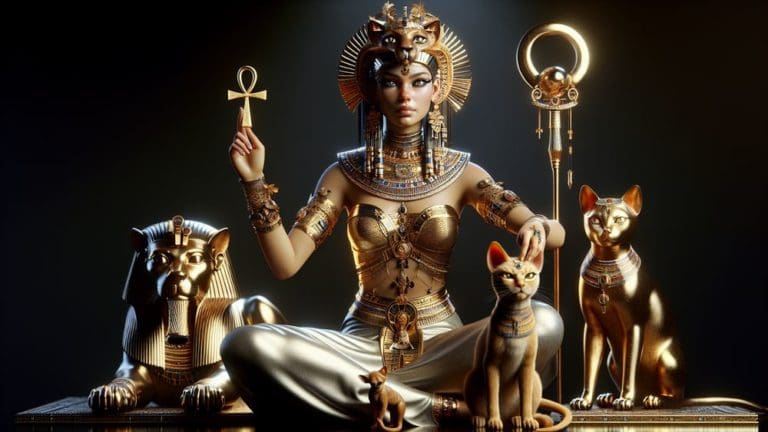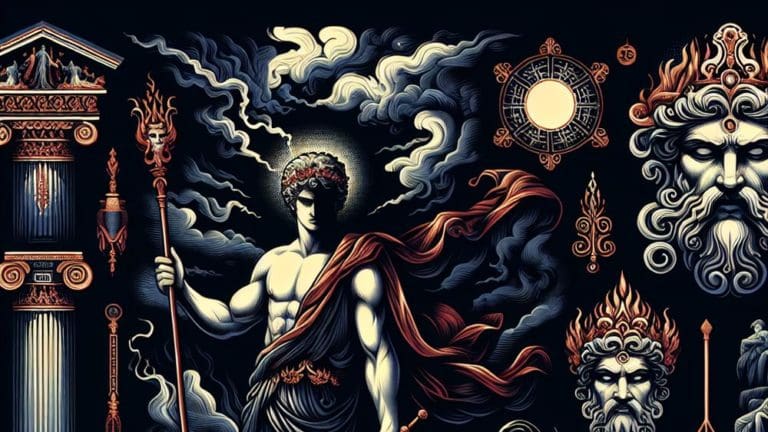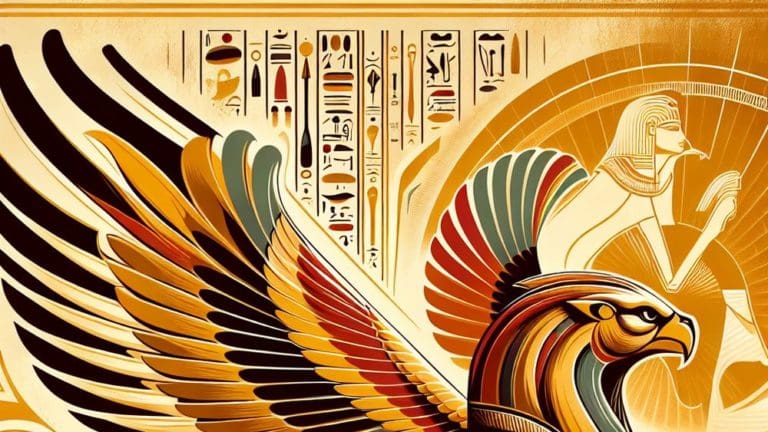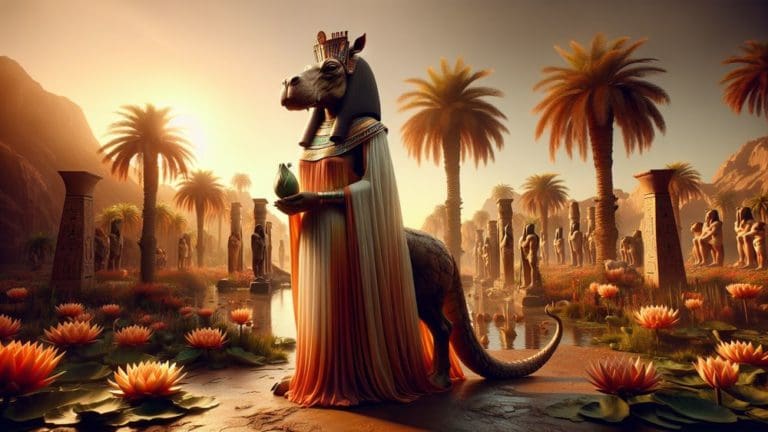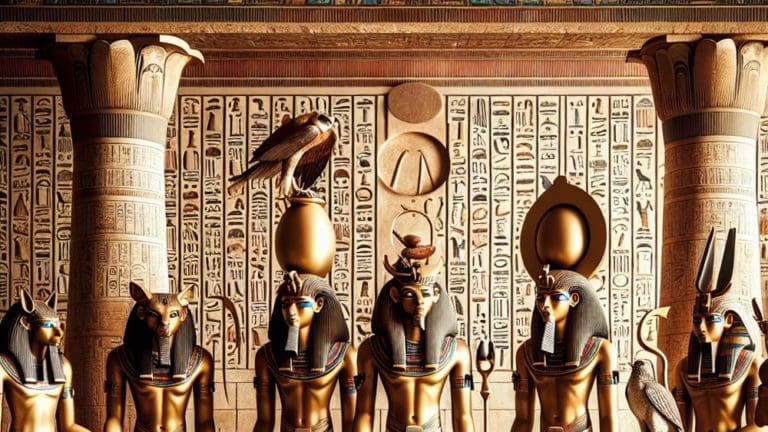Hermes: Greek God Of Herds and Trade, Messenger To The Gods
Hermes: Greek God Of Herds and Trade, Messenger To The Gods
Ah, Hermes, that swift-footed Greek god who zips around the heavens and the underworld, always on some divine errand or another. He’s not just any messenger; he’s the go-to guy for the Olympian gods, bridging the gap between mortals and divinities with ease and style. I get it, when you think of Hermes, you probably imagine him with his winged sandals and caduceus, but oh, there’s so much more to this deity than just delivering messages.
Key Points:
- Hermes is the Greek god of herds, trade, and messenger to the gods.
- His family includes Zeus as his father, Maia as his mother, and Apollo as his half-brother.
- Hermes is known for his cleverness and versatility, with roles as a messenger, guide to the underworld, and patron of trade, thieves, and travelers.
- He invented the lyre from a tortoise shell, stole Apollo’s cattle, and made a peace offering to settle their dispute.
- Symbols associated with Hermes include the caduceus, winged sandals, and helm, representing his roles as a messenger and guide.
- Hermes is worshipped in ancient Greek religion for his roles in boundaries, transitions, and communication.
- Key myths involving Hermes include his theft of Apollo’s cattle and his aid to Odysseus in the Odyssey.
Dive into the tales of Hermes and you’ll find a god of many hats – he’s the patron of trade, travelers, and even thieves (yeah, you heard that right). His birth story? Absolutely awesome. His family ties? Think of the most complicated family tree, and then add some divinity into the mix. And those myths involving him? They are the stuff of legend, literally. So, let’s unravel the story of Hermes piece by intriguing piece. No big deal, right?
The Origins and Family of Hermes
Talking about Hermes’ family is like diving into an epic soap opera, with twists you wouldn’t believe unless they were written down. Born of Zeus, the top god himself, and Maia, a lovely nymph, Hermes got into mischief pretty much from day one. And when I say his family is a big deal, I mean it – we’re talking major Olympian gods as relatives.
The Birth of Hermes: A Divine Lineage
Right off the bat, Hermes’ birth story sets him apart as a clever and dynamic character. Born in a cave on Mount Cyllene in Arcadia, Hermes wasted no time making his mark – literally inventing the lyre on his very first day of life from a tortoise shell. How’s that for talent?
- Zeus (Father)
- Maia (Mother)
- Apollo (Half-brother)
This mix of divine parentage places him in a unique position among the Olympian gods, with ninjas-level stealth and wit from the get-go. Hermes’ innate cunningness wasn’t just for show; he used it to navigate the complexities of godly politics and family dynamics.
Hermes’ birth story showcases his exceptional cleverness and inventiveness, setting him apart as a unique and skilled character among the gods.
Siblings and Divine Relations
Given his lineage, Hermes found himself in the thick of Olympian drama from the start. His siblings and divine relations read like a who’s who of ancient Greek mythology, showcasing the interconnectedness and complexities of godly kinships.

- Apollo: Not just a half-brother but also a kind of frenemy, thanks to Hermes’ cattle-stealing antics.
- Athena: A fellow Olympian with whom Hermes shared a penchant for cleverness and strategic thinking.
- Dionysus: Another half-brother, with whom Hermes would share many adventures, bridging the gap between the wild and the civilized.
Together, these relationships paint a picture of Hermes not just as a messenger of the gods but as a central figure in the unfolding drama of Olympian politics and antics.
The Multifaceted Roles of Hermes
If Hermes had a resume, it’d be too long to fit on a single scroll. This god wasn’t sticking to just one job; he was the ancient Greek go-to for anything requiring inventiveness and quick travel.
Messenger of the Gods and Guide to the Underworld
As the messenger of the gods, Hermes had the crucial task of delivering divine messages across the heavens and to the underworld. That’s right, this guy didn’t just stop at earth’s surface; he had the chops to navigate the realm of the dead, guiding souls to the afterlife. The role of Hermes involves communicating the will of the gods to humans and deities alike, making sure everyone’s on the same page (or at least trying to).
Hermes’ role as a messenger involved delivering divine messages across realms, ensuring communication between gods, humans, and deities.
Patron of Trade, Thieves, and Travelers
Beyond his heavenly postal duties, Hermes was also the patron of trade, ensuring merchants could strike fair deals and that the roads they traveled were safe. But it’s not all business; he’s also the god of thieves – kind of a “steal cleverly” endorsement. And for travelers? He’s their protector, making sure their journeys are smooth and trickster-free. Hermes represents the idea that travel, trade, and even thievery have their own kinds of wisdom and cunning necessary for success.
Hermes in Myths: Key Stories and Adventures
Hermes, the Greek god of herds, trade, and messenger to the gods, has some fascinating stories that are nothing short of epic adventures. One of the most thrilling tales is how he invented the lyre on the very day he was born.
Using a tortoise shell, he strung it with cow gut, creating the first lyre. Then, as a cheeky newborn, he stole Apollo’s cattle. I get it, stealing on day one? Pretty bold move.
But Hermes didn’t stop there. The story of Hermes and the cattle of Apollo takes an interesting twist when he cleverly walks the cows backward, making it hard for Apollo to track them. He even sacrificed two cows to the gods and divided them into twelve parts, representing the Olympian gods.
He then returned to his cradle, playing innocent. Apollo was furious, but when he heard Hermes play the lyre, he was so mesmerized that he forgave him and even traded his cattle for the lyre. Awesome, right?
- Invented the lyre from a tortoise shell
- Stole Apollo’s cattle cleverly
- Sacrificed two cows to the gods
- Traded the lyre with Apollo, settling their dispute
Hermes showcased creativity, cunning, and charm in the epic tale of inventing the lyre, stealing Apollo’s cattle, making a clever sacrifice, and ultimately resolving the conflict through a trade.
Symbols and Attributes of Hermes
Hermes is easily recognized by his iconic symbols and attributes. The caduceus, his winged sandals (talaria), and the petasos (his winged helm) are classic. These symbols are not just cool accessories; they’re loaded with ancient meanings and stories.
The Caduceus and Its Significance
The caduceus, often confused with the rod of Asclepius, is a staff entwined by two snakes and topped with wings. It’s a potent symbol of Hermes’ role as a messenger and mediator between the realms. The snakes represent duality and balance, while the wings symbolize speed and freedom.
Originally, this staff was a symbol of peace, used to stop enemies in their tracks. Hermes wielding the caduceus signifies his ability to negotiate peace and guide souls to the underworld. It’s a nod to his role as a guide, showing the way for both goods and souls.
The caduceus also holds a deeper meaning, embodying the union of opposites; heaven and earth, life and death. It’s a reminder of Hermes’ role as both a messenger of the gods and a guide to the underworld. No big deal, just balancing the cosmic scales.
Winged Sandals and Helm: Tools of the Divine Messenger
The winged sandals, known as talaria, and Hermes’ helm, the petasos, are not just fashion statements. They’re key to his role as the divine messenger. The sandals allowed him to fly, darting across the heavens and earth, delivering messages at blazing speed.
Imagine Hermes, speeding through the sky, the wind ruffling his helm, as he delivers messages from Zeus or guides souls. These tools symbolized his swiftness and freedom, traits crucial for a messenger who navigates both mortal and divine realms.
Embrace the symbolism of swiftness and freedom embodied by Hermes’ winged sandals and helm, essential traits for navigating the complexities of mortal and divine realms in your own life journey.
Sacred Animals and Plants Associated with Hermes
Hermes had a knack for being associated with some pretty significant animals and plants. Each of these had their own place in the stories and myths surrounding our fleet-footed god.
The tortoise, for instance, represents the invention of the lyre, reminding us of Hermes’ cleverness and resourcefulness. Then, there’s the ram, symbolizing leadership and protection, vital traits for someone guiding souls to the underworld.
| Animals/Plants | Significance to Hermes |
|---|---|
| Tortoise | Invention of the lyre |
| Ram | Leadership and protection |
| Palm Tree | Symbol of victory and peace |
| Crocus | Associated with the renewal of nature |
These symbols are not just for show. They weave a deeper narrative about Hermes’ character and the diverse roles he played.
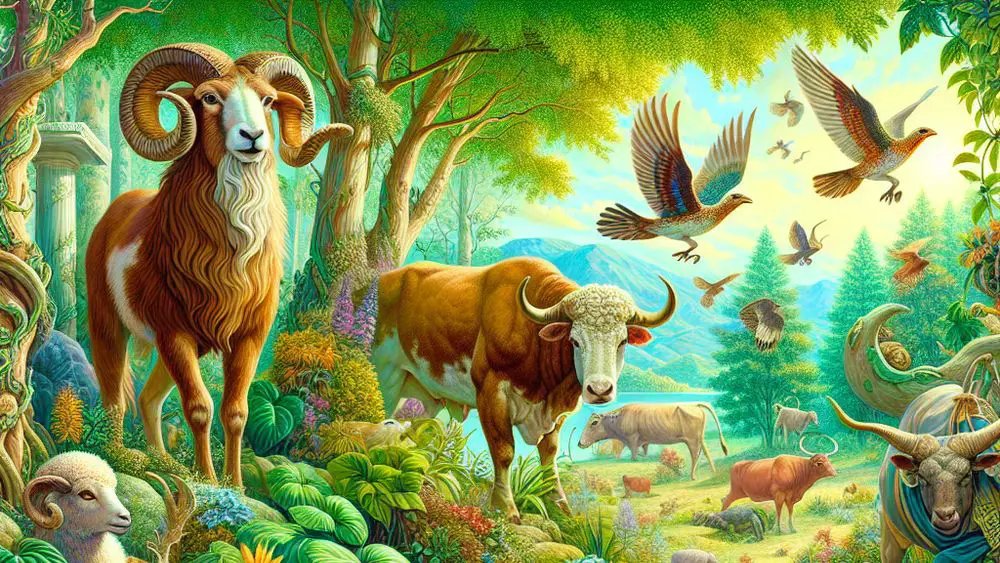
List of All Greek Mythology Gods
For the folks hooked on Greek mythology, diving into the pantheon of gods can be like wandering an endless labyrinth of stories, each more fascinating than the last. And guess what? I’ve got the perfect map for you.
Check out this awesome list of all the greek gods. It’s like the ultimate cheat sheet, giving you a snapshot of the who’s who in Olympus and beyond. So, dive in and let your mythology adventure begin!
FAQs
1. How did Hermes become the messenger of the gods?
Hermes became the messenger of the gods through his cleverness and speed. Immediately after his birth, he invented the lyre and traded it to his brother Apollo, securing his position as a messenger. This story showcases his wit and capability, qualities essential for the gods’ messenger.
2. What are some of the most famous myths involving Hermes?
Some of the most famous myths involving Hermes include his theft of Apollo’s cattle on the day he was born and inventing the lyre from a turtle shell. Another notable myth is his role in the Odyssey, aiding Odysseus on his journey home. These myths highlight Hermes’ cunning and versatility.
3. Can you explain the significance of Hermes’ winged sandals?
The significance of Hermes’ winged sandals lies in their representation of his role as the gods’ messenger. These sandals allowed him to travel at incredible speeds, both to the world of the gods and humans, facilitating communication. They are a symbol of his agility and swiftness, key attributes for his duties as a messenger.
4. How is Hermes worshipped in ancient Greek religion?
In ancient Greek religion, Hermes was worshipped as a god of boundaries and transitions, which made him a protector of travelers and merchants. He was also venerated as a herald of the gods, which involved offerings and prayers to secure safe passage and prosperity. Festivals like the Hermaea were dedicated to him, celebrating his versatile roles in Greek society.
Conclusion
Diving into the world of Hermes has been nothing short of a fascinating journey. From his birth to his role as the messenger of the gods, Hermes embodies the qualities of wit, charm, and versatility that not only made him indispensable among the Olympian gods but also endeared him to mortals. His symbols, from the caduceus to his famous winged sandals, tell the story of a deity whose influence traversed both the divine and the earthly realms. Hermes’ legacy lives on, reminding us of the power of communication and cunning in overcoming obstacles. So, let’s keep the magic of mythology alive by exploring more stories like these. Until next time, keep wondering about the awesome tales from the past.
Cheers and much love,
Cedric


